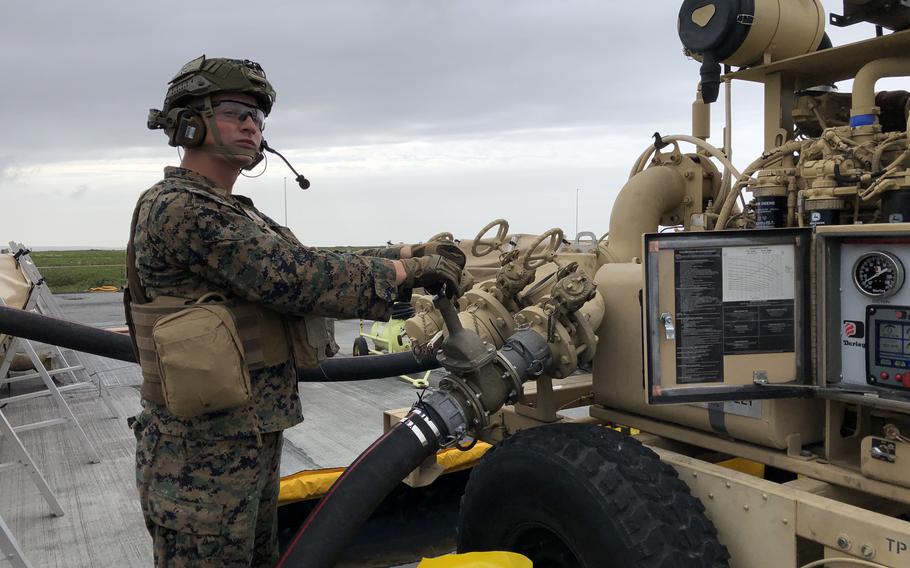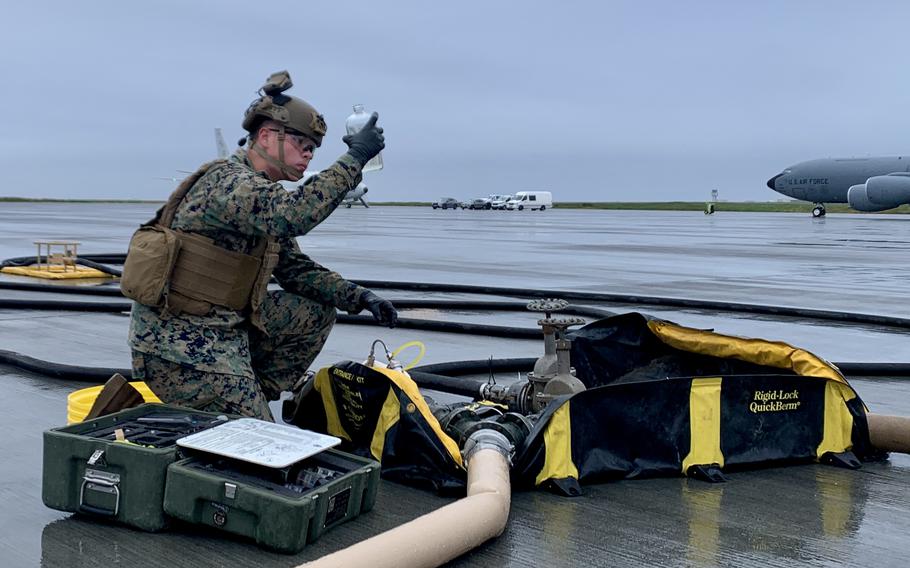
Lance Cpl. Jonathan Williamson of Marine Wing Support Squadron 271 mans a pump for aviation fuel Sept. 2, 2024, during the U.S.-led Northern Viking exercise at Keflavik Air Base in Iceland. While on the island, Williamson and other Marines from MWSS 271 toured civilian aviation fuel facilities to increase their knowledge needed for Contingency Quality Assurance Specialist – Fuels certification. (Alison Bath/Stars and Stripes)
KEFLAVIK, Iceland — When Lance Cpl. Jonathan Williamson leaves the Marine Corps in a few months, he’s hoping to parlay the skills acquired during his service as a fuel technician into a well-paying career.
Participation in a Marine Corps pilot program designed to help the service tap into civilian aviation fuel sources worldwide will give him a boost, he said.
“I’m hoping that this will give me some job security — kind of a leg up on the competition,” said Williamson, who is assigned to Marine Wing Support Squadron 271, or MWSS-271.
Williamson and other members of the squadron seeking certification as a Contingency Quality Assurance Specialist – Fuels, or CQAS-F, recently toured several civilian fuel facilities in Iceland. The squadron was on the island to support operations for the U.S.-led Northern Viking exercise, which ended Tuesday.
The CQAS-F program is designed to provide knowledge of commercial aviation fuel facilities, pipelines, storage tanks and related infrastructure, said Chief Warrant Officer 2 James Nieves of MWSS-271.
Having that information on hand helps Marines adapt to changing conditions during overseas operations and make quick use of civilian fuel sources using military equipment, he said.
A CQAS-F trained Marine could provide a commander with a diverse “pool of fuel resources that we can tap into right then and there and we don’t have to change a thing,” Nieves said. “We just need familiarity or someone who is proficient enough to operate that facility.”
To gain that understanding, Marines participating in Northern Viking met with their civilian counterparts on the island, Nieves said.
The interactions were not only helpful in assessing Iceland’s facilities, but also in understanding the realities of the country’s fuel management system.

Lance Cpl. Matthew Trudeau of Marine Wing Support Squadron 271 tests fuel for sediment and water at Keflavik Air Base in Iceland Sept. 2, 2024, during the U.S.-led Northern Viking exercise. Members of the squadron also toured civilian aviation fuel facilities on the island to increase their knowledge needed for Contingency Quality Assurance Specialist – Fuels certification. (Alison Bath/Stars and Stripes)
Some of the locations the squadron toured were staffed by two- or four-man teams fueling millions of gallons daily. Typically, Marine expeditionary operations are staffed by six to 12 Marines pushing a maximum of 30,000 gallons in a day.
The surprising lesson for service personnel was the “quantity and the efficiency the civilian side operates in …,” Nieves said.
Besides giving the Marine Corps greater self-sufficiency, CQAS-F trained Marines can work with the Defense Logistics Agency, other U.S. services or military allies worldwide, Nieves said.
“It really does allow us to organically provide for ourselves and those around us,” he said. “At the end of the day, it’s an aviation ground support mission.”
In existence for about 2.5 years, the program is being considered for eventual designation as a necessary military job specialty, Nieves said.
That potential, along with the challenge of acquiring more knowledge and skills, is exciting for Marines, he said. There are about 33 Marines currently training for the designation. The goal is to have at least 25 service members seeking the certification annually, he said.
“Marines are reenlisting because of this initiative,” said Nieves, who hopes to see the program expanded to include other job classifications. “They see the value behind it … the value it brings (to them).”